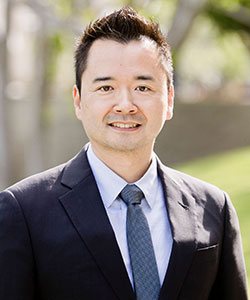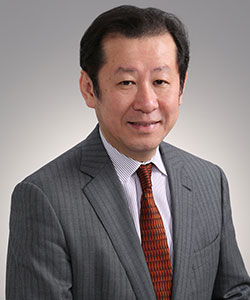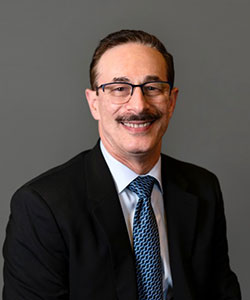2024 Winter Meeting Speakers
January 26 - 28, 2024
Dallas Marriott Las Colinas
223 West Las Colinas Boulevard
Irving, Texas 75039
 Paul P. Chang, DDS MS - Periodontics & Implant Center of McKinney Paul P. Chang, DDS MS - Periodontics & Implant Center of McKinney
Dr. Chang attended Baltimore College of Dentistry in Maryland where he earned his Doctorate of Dental Surgery in 2003. He then completed an extensive five-year residency program at the University of Texas Health Science Center at San Antonio (UTHSCSA), where he was awarded specialty certificates in both Periodontics and Prosthodontics. While in San Antonio, he also completed his research on bio- modification of titanium surfaces to improve initial implant stability and earned his master’s degree in the school of Biological Science.• During residency, Dr. Chang participated in various trial studies of NobleBiocare, Procera all zirconia implant restorations. He was the first dentist in the U.S. to have successfully restored full arch implant cases utilizing all zirconia, screw retained implant bridges, as well as the Procera all zirconia, full arch screw retained hybrid restoration.• Less than a year after completing his residency program, he successfully challenged both the American Board of Periodontology & American Board of Prosthodontics’ board examinations. He is one of only few dual board-certified dental specialists in both periodontics and prosthodontics in the United States.• Dr. Chang currently maintains his specialty practice in McKinney, Texas.
Disclosure of Relevant Financial Relationships: None
Management and Prevention of Peri-Implant Diseases using Er,Cr:YSGG laser
Abstract
Dental implants have become widely accepted for the replacement of missing teeth due to their high success of osseointegration. With more implants being placed and in function, we are facing a significant increase in complications ranging from screw loosening, implant fracture, gum recession and bone loss. Dental implant complications can occur at any point in the treatment process. Proper treatment planning, surgical technique and precise fit of the restoration can help avoid complications. This presentation will empower clinicians with the skill and knowledge to effectively prevent and manage implant complications, when they occur, using Er,Cr:YSGG laser implant repair protocol. Why Er,Cr:YSGG laser wavelength is the most effective tool in decontaminating diseased implant surface. The mechanism of action of different laser wavelength will be discussed.
Learning Objectives
- Compare and contrast different laser systems on soft and hard tissue.
- Determine which laser wavelength is best suited for implant surface decontamination.
- Treat both non-surgically and surgically using latest laser implant repair protocol
Teaching Method: Lecture
 Masahiko Nikaido, DDS - Private Practice, Tokyo, Japan Masahiko Nikaido, DDS - Private Practice, Tokyo, Japan
Dr. Masahiko Nikaido received his DDS from Tokyo Dental College in 1981. After several years in in a private practice, he completed the post graduate program in Periodontology, Tufts University School of Dental Medicine in Boston, MA in 1997. He became a diplomate of American Board of Periodontology in 2003.
While he is maintaining a private practice, specializing in periodontics and implantology in Tokyo, Japan, he teaches at Tokyo Dental College as a Clinical professor.
Dr. Nikaido is a past president of Japanese Academy of Clinical Periodontology.
Disclosure of Relevant Financial Relationships: GC America and Consultant
Peri-Implantitis: Where Are we Now?
Abstract
Peri-implant disease has attracted our attention for more than 20 years. However, we are still trying to figure out its true etiology. Why is it so difficult to treat it?In this presentation, I would like to follow my path to understand and try to overcome this disease. Clinical cases with both non-surgical and surgical interventions will be presented.
Learning Objectives
- Learn how to manage dental implant therapy for periodontally compromised patients.
- Understand different etiologic factors of peri- implant diseases.
- Understand different etiologic factors of peri- implant diseases.
Teaching Method: Lecture
 Paul S. Rosen, DMD, MS - Private Practices: Yardley, PA and New York, NY; Rutgers University School of Dental Medicine Paul S. Rosen, DMD, MS - Private Practices: Yardley, PA and New York, NY; Rutgers University School of Dental Medicine
Dr. Paul Rosen maintains full-time private practices in both Yardley, Pennsylvania and New York, New York limited to periodontics, surgical implant placement and regenerative therapy. He also has appointments as a Clinical Professor of Periodontics at both Rutgers University School of Dental Medicine and the University of Maryland Dental School . Dr. Rosen is a Diplomate of the American Board of Periodontology and has been an Examiner for the Board as well. He has served on a number of committees for the American Academy of Periodontology. Dr. Rosen is a reviewer for and serves on the editorial advisory boards for a number of dental journals. Dr. Rosen has authored/co-authored a number of articles and several book chapters on periodontal regeneration, implants and interrelated orthodontic-periodontal care and lectured both nationally and internationally on the subjects of dental implants and regeneration for both teeth and dental implants. Dr. Rosen is honored for his work by receiving a number of prestigious awards including the American Academy of Periodontology’s Master Clinician Award in 2015, the Northeastern Society of Periodontists Isidor Hirschfeld Award for Clinical Excellence in 2016, and the Distinguished Alumnus Award for Professional Achievement from the University of Maryland Dental School in 2020.
Disclosure of Relevant Financial Relationships: LifeNet Health, Snoasis Medical, Keystone Dental Group, Theradaptive, Brasseler, GC America and LaunchPad
How Do We Go About Successfully Managing Peri-implantitis
Abstract
Dental implants are an important treatment approach for managing a broad range of clinical problems. They are not however, immune to biologic complications which if not treated in a timely manner, can threaten dental implant survival. Peri-implant mucositis is an inflammatory biologic complication affecting the surrounding soft tissue of a dental implant while peri-implantitis, which may be a progression of peri-implant mucositis, involves loss of supporting bone beyond physiologic bone remodeling. More information is coming out in the literature on how to best manage these two problems and the dilemma is what to do given that most approaches are supported by limited case report evidence. This lecture will explore both some of the causes and treatment options available for these biologic complications, providing some of their risks, limitations and benefits.
Learning Objectives
- List some of the emerging causes to peri-implantitis.
- Discuss the benefits and limitations for both resective and regenerative approaches for treating peri-implantitis.
- Discuss some of the methods for surface decontamination of a dental implant.
Teaching Method: Lecture
|